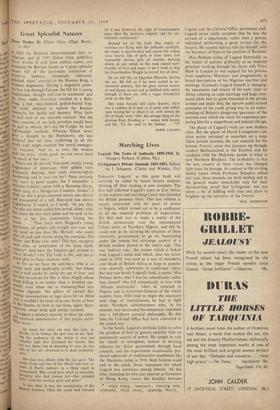Marching Lives
Lugard: The Years of Authority 1895-1945. By Margery Perham. (Collins, 50s.)
RH A M `Lugard,' as this great book will
certainly be called by future history students showing off their reading, is now complete. The first half followed Lugard's years in East Africa as the explorer and marching Cwsar who founded the British presence there. This last volume is mostly concerned with his years of power in Nigeria, which turned out to be a conflueme of all the essential problems of imperialism. His first task was to make a reality of the British protectorate over the unconquered Fulani emirs of Northern Nigeria, and this he could only do by allowing the structure of these autocratic governments to go on functioning under the remote but sovereign control of a British resident posted at the emir's side. This was 'indirect rule.' the.system which is linked with Lugard's name and which, after his retire- ment in 1919, was used as a sort of anEesthetic over much of British Africa to keep its popula- tions drowsily submissive to traditional rulers. But that was hardly Lugard's fault, it seems. Miss Perham shows that it was his subordinates rather than himself who fell romantically in love with 'African institutions': when he returned to Nigeria and as Governor-General of the whole country from 1914 tried to begin the necessary next stage of centralisation, he had to fight down Northern administrators who, in his absence, had barricaded his temporary expedient into a full-blown colonial philosophy. By this time the Colonial Office had been converted to the system too.
In the South, Lugard's methods failed to solve the problem of how to govern societies with no paramount sources of power. He sought in vain for 'chiefs' to strengthen, instead of devising schemes for direct government through local councils, and his experiments occasionally pro- duced upheavals of traditionalist resentment like the Abeokuta rising in 1918. Such failures could end in the quick, fierce repression for which Lugard was notorious among liberals. All this time, including his five-year interval as Governor of Hong Kong, recurs the hostility between
Lugard and the Colonial Office permanent staff. Lugard never really accepted that he was the servant of a department, rather than a private individual performing a great service for the Empire. He wanted indirect rule for himself, with the Secretary of State in the position of Resident.
Miss Perham writes of Lugard historically as the maker of nations; politically as 'an imperial governor working through his clever wife Flora Shaw in London to win support for his policies from suspicious Ministers; and imaginatively in broad descriptions of his Nigerian marches and meetings. Gradually Lugard himself is changing, the unsureness and misery of his early years in Africa relaxing as calm marriage and huge com- mand allow him to grow interested in the people around and under him, the narrow public-school certainties of his youth giving way to an under- standing of Britain's dangerous ignorance of the societies over which she ruled: his experience pre- paring him for a magnificent and judicial old age.
The places of Lugard's work are now modern cities. But the places of David Livingstone's are often points unvisited or uncertain on a map. These private journals, the raw material for his famous Travels, cover two journeys up through modern Bechuanaland to the Zambesi and his residence with the Makololo people in what is now Northern Rhodesia. The probability is that the sere country of these travels has changed little since his passage. In contrast to the exciting family letters which Professor Schapera edited last year, these journals are drab reading and to the general reader remarkable only for their disconcerting proof that Livingstone was not above a bit of fiddling with time and place to brighten up the narrative of the Travels.
NEAL ASCHERSON


































 Previous page
Previous page